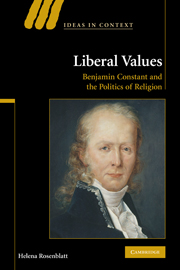Book contents
- Frontmatter
- Contents
- Acknowledgements
- Note on translations
- List of abbreviations
- Introduction
- Chapter 1 Constant's education: the French, Scottish, and German Enlightenments
- Chapter 2 The crucible of the Directory years
- Chapter 3 Napoleon, or battling “the new Cyrus”
- Chapter 4 Constant becomes Constant: from the Principles of Politics (1806) to The Spirit of Conquest and Usurpation (1814)
- Chapter 5 Politics and religion during the Restoration (1814–1824)
- Chapter 6 “The Protestant Bossuet”: De la religion in political context (1824–1830)
- Chapter 7 Constant's legacy
- Select bibliography
- Index
- Ideas in Context
Chapter 5 - Politics and religion during the Restoration (1814–1824)
Published online by Cambridge University Press: 22 September 2009
- Frontmatter
- Contents
- Acknowledgements
- Note on translations
- List of abbreviations
- Introduction
- Chapter 1 Constant's education: the French, Scottish, and German Enlightenments
- Chapter 2 The crucible of the Directory years
- Chapter 3 Napoleon, or battling “the new Cyrus”
- Chapter 4 Constant becomes Constant: from the Principles of Politics (1806) to The Spirit of Conquest and Usurpation (1814)
- Chapter 5 Politics and religion during the Restoration (1814–1824)
- Chapter 6 “The Protestant Bossuet”: De la religion in political context (1824–1830)
- Chapter 7 Constant's legacy
- Select bibliography
- Index
- Ideas in Context
Summary
KEEPING POLITICAL LIBERTY ALIVE
Constant's vacillations
Constant's vacillations during the early phases of the Restoration have been well scrutinized. First, upon the collapse of Napoleon's regime, Constant rallied to the constitutional monarchy of Louis XVIII; he even produced the outline of a constitution for such a monarchy, which he published in May 1814. Then, upon Napoleon's return less than a year later, Constant switched allegiances, accepting a position in Napoleon's Council of State, and producing a constitution for him as well. After Napoleon's second abdication and the re-ascension of Louis XVIII, Constant once again rallied to this government, eventually becoming one of its staunchest defenders. Such rapid turn-abouts elicited charges of inconsistency, opportunism, and hypocrisy that dogged Constant for the rest of his life and which have made a lasting imprint on scholars. His adversaries called him, at worst, an unprincipled turncoat or, at best, a wavering fool, someone so desperate for a political position in government that he would sacrifice his most basic principles for a spot in the limelight. It was suggested that the real reason for his erratic behavior involved one of his last great “extravagances,” an intensely passionate and rather bizarre infatuation with the legendary beauty, Juliette Récamier (1777–1849). At the time, Récamier had three other suitors, all of whom Constant, in fits of jealous despair, challenged to duels. Meanwhile, his love for Récamier remained unrequited, making him seem all the more pathetic.
- Type
- Chapter
- Information
- Liberal ValuesBenjamin Constant and the Politics of Religion, pp. 155 - 191Publisher: Cambridge University PressPrint publication year: 2008

